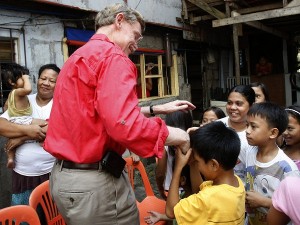
FIRSTHAND VIEW World Bank president Robert Zoellick reacts as a boy places Zoellick's hand on his forehead in the traditional gesture of respect during his visit to a slum community to get a firsthand view of the government's Conditional Cash Transfer program for the poor at suburban Pasay city, Wednesday Oct. 26, 2011. In their statement, Zoellick is in Manila for a visit "aimed at strengthening the Bank's partnership with the Philippines as it pursues reforms for good governance and to overcome poverty." AP photo/Bullit Marquez)
For the Philippines to achieve inclusive growth, it must build on the foundations of “people power” through government reforms, civil society participation and social safety nets, World Bank Group president Robert B. Zoellick said in a statement.
“The People Power revolution of 1986 opened an opportunity,” said Zoellick, who arrived in the Philippines on Tuesday. The multilateral agency said the visit was aimed at strengthening the bank’s partnership with the Philippines as it pursues reforms to improve governance and to overcome poverty.
Under the theme “Making Growth Work for the Poor,” the World Bank Group has been supporting the Philippine Development Plan. The multilateral agency said that as of September this year, it has a total commitment of more than $2 billion, with an additional $185 million from its private sector arm, the International Finance Corp.
Zoellick’s visit to the Philippines comes almost a month after President Aquino gave a speech during the Annual Meetings of the World Bank-IMF in Washington, DC, outlining his moves to boost good governance and accountability to benefit the poor.
“The World Bank shares the view that fighting corruption and boosting transparency are vital to development,” Zoellick said. “We know corruption is a drag on the economy, taxes the poor, and strangles opportunity, so I am looking forward to seeing firsthand and learning from some of the reforms President Aquino has put in place to improve governance.”
The focus on good governance could help boost economic growth as better governance would improve the investment climate as well as help ensure efficient public spending, he said.
While in the Philippines, Zoellick will meet President Aquino and the country’s economic managers. Zoellick will also meet with leaders and representatives of civil society organizations as well as the private sector.
A strong and engaged civil society could also combine with transparency and good governance to make for more resilient societies and stronger, more inclusive growth, Zoellick said.
The World Bank president will also visit a poor community to meet with people benefiting from the government’s conditional cash transfer program “Pantawid Pamilya,” which provides families with cash if they send their children to school and comply with health checks.
Launched in 2008 with support from the World Bank, the program has benefited about 2.2 million households that include 6 million children up through age 14.